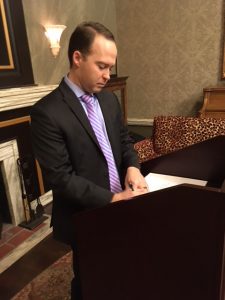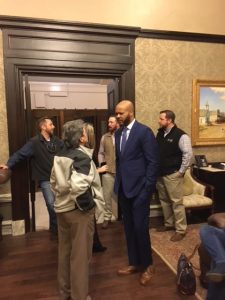
Mark Yates, the director of OK WindPower is no stranger to politics. But as he held a Tuesday state capitol news conference where he lamented the anti-wind rhetoric had created a climate of volatility at the capitol, real politics stepped up and put an end to his scheduled event.
It was in the House Lounge located behind the State House chambers where Yates and his supporters gathered to defend their industry against calls for possible double taxation on the industry. Thirty-six minutes into his news conference, he was interrupted by a Sergeant of Arms representing House Speaker Charles McCall.
“The Speaker’s office has directed me to stop the meeting,” said the green-jacketed aide. “Move it somewhere else.”
Minutes earlier, Yates had told reporters and supporters, “The political volatility has really created a climate that is not healthy for Oklahoma.” Little did he know how prescient the statement was.
It was a news conference designed to respond in part to allegations from Step Up Oklahoma that the wind industry was not cooperating in resolving Oklahoma’s government budget crisis.
“We were not part of those original conversations behind closed doors,” explained Yates.
Much as he had told OK Energy Today in an interview published this week, Yates made it clear his industry would not stand for double taxation as some are suggesting.
One proposal calls for a $1 a megawatt hour of electrical power generation, but Yates isn’t sure of the source of the idea. He believes the $1 tax would be double taxation because the wind farms located in 23 counties in the state are already paying ad valorem taxes that fund dozens of local school districts.

Surrounded by some wind farm employees and representatives of one of the state’s biggest wind farm operators, Enel Green Power of North America, Yates made his case.
“When we sat down with the Step Up group, we made it abundantly clear that one, retroactivity is off the table. We can ill afford to go back and undo what has been done,” said Yates. “We’re asking the state of Oklahoma to live up to its promises to these companies that were recruited to bring billions of dollars of investments.”
His point was that any increase in taxes on the wind industry would essentially jeopardize ad valorem taxes for the school districts.
“We would prefer as an industry not to be put in a corner to where we’re gonna see detrimental impact to the local level,” he added.
Yates said his group is willing to come to the table and talk about power generation taxes but not under what he called a “false premise” that the wind industry can be compared to the oil and gas industry.
“It’s not the same. We’re not in the same ballpark. But we took them up on their false premise and said we will take the same tax structure as oil and gas. But making the point today, our relative tax burden is already higher than the 7 percent GPT (Gross Production Tax). That was not amenable.”
He said a second proposal called for a flat tax on the wind industry but again, it was turned down.
“We have brought viable options to the group that have been rejected. They’ve broken away,” said Yates. “We are not anti-Step Up. This is not what the issue is about.We want the truth to be told.”
Joining Yates for the news event were Chuck Coffey, owner of the Double CC Cattle Company in southern Oklahoma and Former Garfield County Assessor Wade Patterson.
A wind farm is located on Coffey’s ranch and he spoke in defense of the industry, saying it allows him and his wife to transfer the ranch to the next generation and keep it intact.
“I hope you will not let other industries manipulate the wind industry,” he pleaded in concluding his remarks.
Patterson, now a consultant called the wind farms in Garfield county a “great revenue stream.”
He contended if the wind industry is hit with a double tax, it will harm more than 50 school districts now receiving tax revenue from the wind farms. He said in most cases, the wind farms are the number one taxpayer for the schools.
“There’s no doubt, the anti-wind groups that have sprung up have definitely created a climate of volatility,” said Yates. “The state’s business reputation is on the line. There’s no doubt it appears the proposals on the table are punitive to the wind industry.”
With some lawmakers standing in the doorway listening to his comments, Yates said, “Instead of having this senseless infighting between industries, we need to be looking for how do we go out and recruit more folks to come into our state and bring jobs. that’s the conversation we need to be having.”






